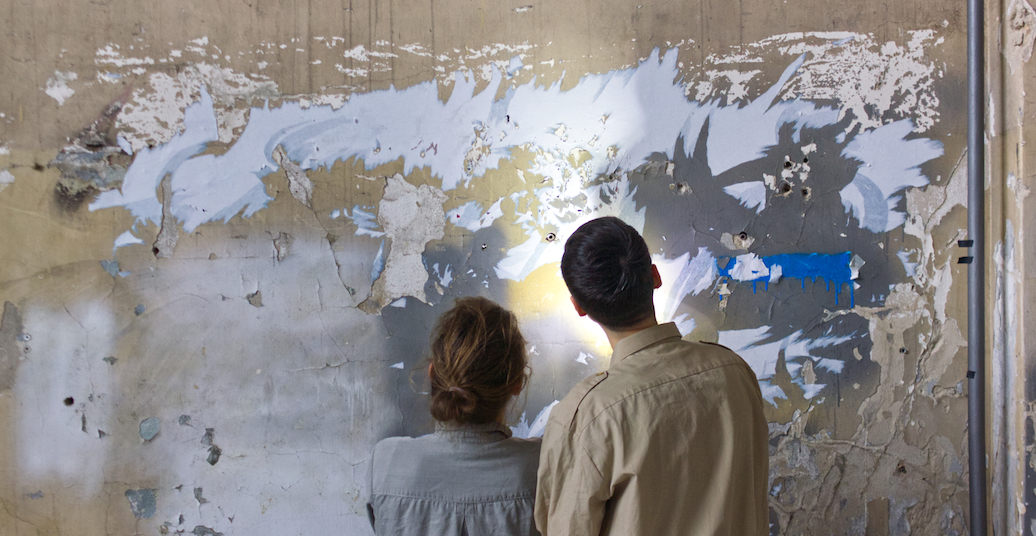With “Zur Zartheit von Rissen” (The delicacy of cracks, 3 – 5 February 2023), Lea Martini and Bella Hager present a finely crafted blend of sensory expedition, performance and retreat, and a quiet homage to Uferstudios’ Heizhaus.
I must admit that sometimes I like to go to the theatre to be alone. Yes, theatre might be this site of bodily copresence, interaction, encounters; still, my favorite moment is the one when the lights go out and I can enjoy my peace and quiet without the need to talk or perform. This time, I won’t have that moment. This piece will be something between everyday life, theatrical production, encounter, and discovery.
At 3:58 PM, exactly one hour before sundown, the audience is supposed to gather in Uferstudios’ Heizhaus. Each visitor is greeted individually and warmly; I am given a questionnaire to complete on my own. My answers determine in which of the six tours I’ll participate: I have to choose which genre I prefer (news, fiction, historical reports, or poetry), if I like words or sounds better, what mood I am in right now (am I curious or am I exhausted), whether it’s hard for me to be the center of attention. My result is: audio tour. Together with five other people I am led outside; we are given headphones and guided, with the help of the audio track, through the Heizhaus.
The Heizhaus is riddled with traces and memories. We learn a bit about the history of the place as the central source of heating for Uferstudios with its own ecosystem, about the furnaces and boiler towers, the heating pipes and the copper organ.
What is there? is the initial question in a tour that brings our attention repeatedly to what appears to be insignificant, to the unspectacular. For example, we are invited to observe closely the patina and individual holes on the walls, heating pipes, the huge windows, an old cabinet with many switches at the “heat transfer station.” A certain degree of openness and unhurriedness are necessary for this type of exploration, to give oneself over to the mundane in such detail, and it leads automatically to further questions: How do we move through this world, and what does it mean to really pay attention, for once, to the things around us? I put my hand on the uneven wall, riddled with cracks and holes, the plaster half crumbled away. It feels surprisingly good—rough, warm, solid.
The people taking the other five tours are moving around us. Some are fastened to one another with rope and explore the room in pairs. Others lie on a board with casters and are pushed across the space, their eyes fixed on the ceiling. Two people spend the entire time lying in the middle of the room on a platform, on huge pillows, and observe what’s happening around them. If I had answered differently at the beginning, I think, I could be lying on those pillows right now, letting my gaze wander.
The audio track ends and we are left to our own devices. For a while nothing in particular happens; a few people walk around with headlamps, others sit on the ground, red and yellow and blue light sources trace lines across the space, we hear the sounds of water splashing. Just as I am asking myself to what extent this situation is still a theatrical event, Lea Martini starts to sing, first quietly and then louder; the rest of the team gradually joins in and a song that seems to play from nowhere mingles with their voices—a melody like something out of a nursery rhyme:
One window, two windows
three windows, four windows
and more windows
all around them railings
and pipes
and struts.
It is remarkable how carefree, playful, and careful the artistic team (Bella Hager, Lea Martini, Marta Forsberg, Gilda Coustier, Francisca Saez Agurto) is in their rendition of this song which is obviously about our immediate surroundings: windows, railings, pipes, struts. No one has to prove how cool they are here. In general, I am struck by how friendly and attentive this team is, how intent on creating a safe space in which visitors can have their own discoveries.
My favorite discovery: three small round holes at the crease between floor and exterior wall, through which light and moisture stream. I lean on the wall, sink my head towards the ground, and breathe the vapor in. Smells like a cellar. I sit here for an extended period, daydreaming about childhood, chimneys, autumn, nostalgia.
Finally, Lea Martini puts on a construction helmet and climbs into a kind of mobile ladder, an extendable lift that takes her all the way to the top. It looks abruptly funny, the way she stretches out her arm up there and strokes a spot on the wall with a meter-long stick with large feathers on it. We stand below and look up at her as she cares for the wall up there, this wall which we all now, somehow, also care about.
I leave the site with a newfound fondness for the Heizhaus, and perhaps a quiet sense of the poetry that lies in the things immediately surrounding us without our realizing it.
English translation by Cory Tamler
„Zur Zartheit von Rissen” (“The delicacy of cracks”) by Lea Martini and Bella Hager can be seen at Heizhaus in Uferstudios from 3 to 5 February 2023.
The event begins at 4:00pm on 4 February, and at 4:02 on 5 February 2023 – exact one hour before sunset each day. The entry is free. Please note: Only with binding pre-registration, as the number of visitors is limited.




